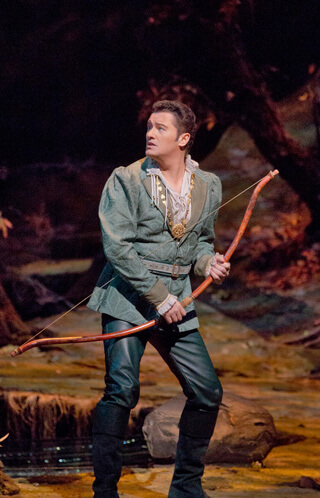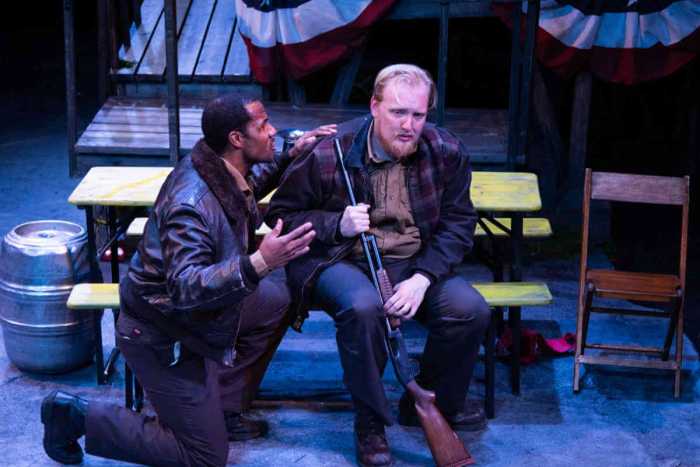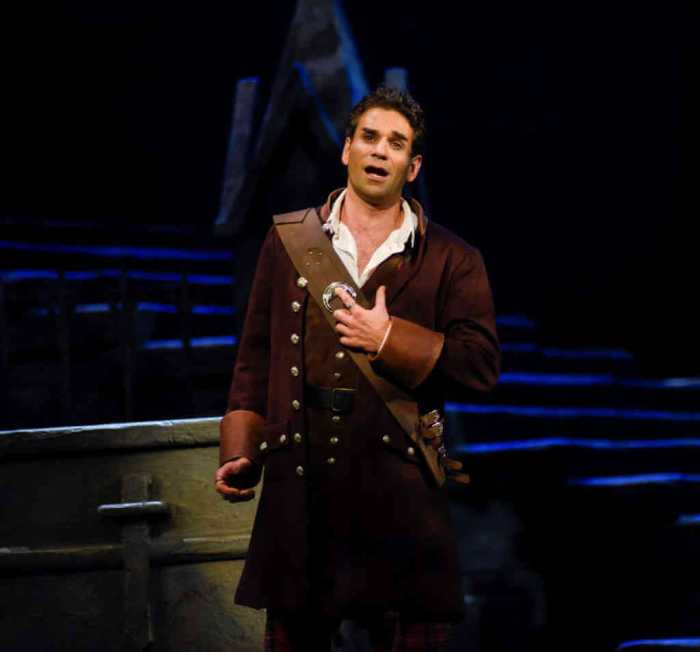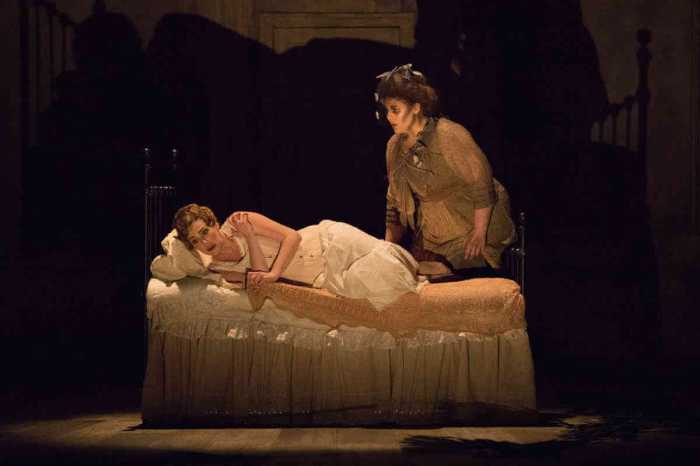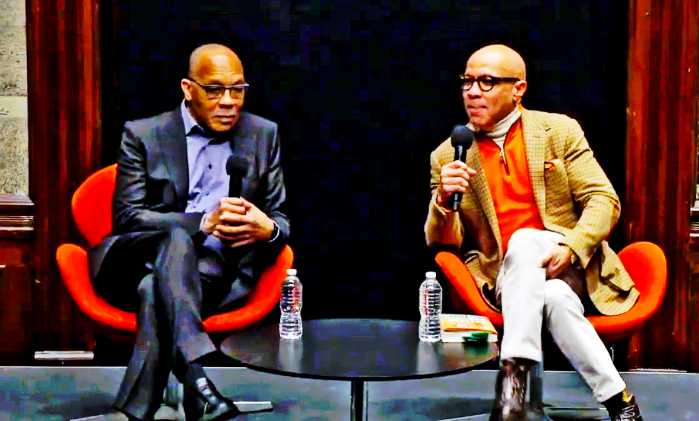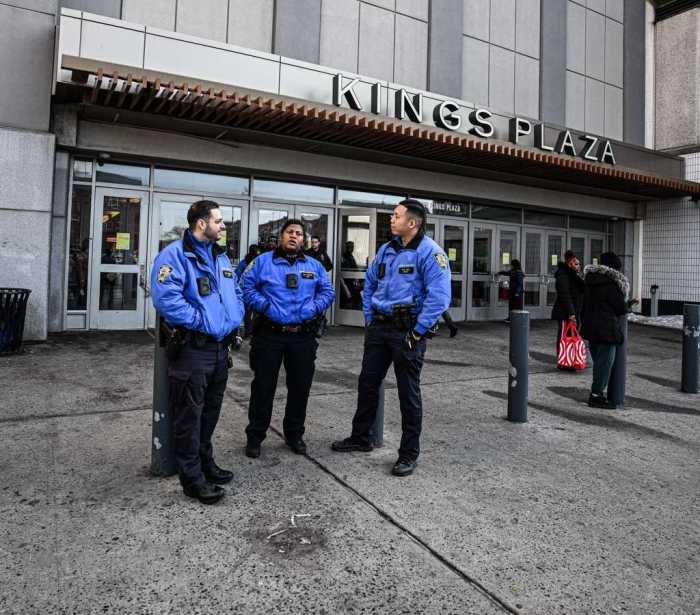Takaoki Onishi as Eugene Onegin and Raquel González as Tatyana in Mary Birnbaum’s condensed, chamber production of the Tchaikovsky opera at Juilliard’s Willson Theater. | RICHARD TERMINE
February 21 witnessed a bittersweet occasion at City Center –– fabulous to see, but with acoustics often jarringly opaque. The valiant New York City Opera Orchestra under the versatile George Manahan paid tribute to the late lamented “people’s opera” with a 70th anniversary concert as a benefit for Local 802’s Musician’s Emergency Fund. The well-conceived tribute reflected the company’s history, ideals, and breadth, and the players sounded relaxed and capable.
The solo singing varied but offered several inspiriting highlights. Energetic septuagenarian Placido Domingo, who made his NYCO debut in 1965 and sang there often before international fame carried him away, graciously appeared to sing — more creditably and nobly than he’s done any previous baritone music hereabouts — “Nemico della patria,” fully involved and sounding quite remarkable.
Opera at City Center, Juilliard, Carnegie Hall, Chicago Lyric
One can’t pretend that time hasn’t left marks on the voices of NYCO’s uncrowned 1990s queens, Amy Burton and Lauren Flanigan. Looking totally glam, however, each found chances to show what absolute conviction and canny professionalism can deliver –– Burton as Puccini’s Lauretta; Flanigan as Verdi’s Lady Macbeth. Jennifer Rivera camped through Rossini’s Rosina but sounded lovely and poignant in Chabrier’s “L’Etoile.” Heather Johnson, eight and a half months pregnant, endearingly sang Carmen’s seductive entrance aria. A fine artist with a quality middleweight mezzo and keen dramatic instincts, she deserves wider renown.
Sidney Outlaw stole the show with a superbly poised rendition of Pierrot’s Tanzlied from “Die Tote Stadt,” and his rhythmically charged scene from Anthony Davis’ “Malcolm X” made me want to hear the whole piece.
We really need City Opera back. Rumors convey plans afoot.
Hard to exaggerate how much I preferred Mary Birnbaum’s condensed, chamber production of “Eugene Onegin” at Juilliard’s black box Willson Theater (February 23) to the Met’s over-busy “Bristol Rep Gorky” approach, care of Deborah Warner and Fiona Shaw. Birnbaum and her young principals took a detailed emotional journey, very well observed and sung. Grace Laubacher’s squared scrim enclosure, connoting Tatyana’s Romantically filtered world, fell at Onegin’s brusque rejection; Birnbaum’s blocking and Personenregie — including Adam Cates’ choreography –– was pointed and psychologically acute. The trims worked in context, though combining Mme. Larina’s character with Filipeevna’s rendered the doubtless illiterate serf’s comments on outgrowing her youthful literary tastes implausible.
Raquel González embodied Tatyana with lovely, impressive tone and admirable emotional honesty; Liù and Micaela seem obvious roles for now, but her fine soprano’s dark security may lead to spinto parts. A handsome pair of male leads, Takaoki Onishi (Onegin) and Miles Mykkanen (Lensky), engaged audience sympathy. Onishi commands a remarkably attractive bel canto baritone with impressive dynamic span. Mykkanen, impressively musical and duly lyrical in timbre, acted up a storm — correctly unafraid to make the young poet both ardent and silly –– though sometimes treated the text too veristically, spoiling the line. His Russian vowels need considerable further work; in general, the Russian had been coached well. Avery Amereau’s attractive, sonorous Olga was superb.
Bass Önay Köse sounded splendid in Gremin’s irresistible “big tune” and its repeat, but struggled with pitch and rhythm in the tricky transition section –– the main such coordination lapse Matthew Aucoin’s fine musical direction allowed. Sometimes his violins parted company, and the musical adaptation over-privileged the harp. Otherwise the players excelled — as did the whole ensemble on this memorable afternoon.
On March 3, amid its Vienna-fest, Carnegie hosted the echt-Berlin Max Raabe, who with the crack players of his Palast Orchester re-create the Weimar-era big band style. Raabe is very dry and droll, with a not very substantial “Spieltenor,” which flips over into croon fairly low in his range. Like Switzerland’s late gay Spieltenor Hughes Cuénod, he accomplishes much with a lyric shred of a voice. The audience seemed flattered by the Cole Porter and Irving Berlin numbers, but the German songs yielded much more detailed verbal shading and thus proved considerably more rewarding. Not for all tastes — there’s a whiff of deracinated Paul Whitemanshchina about the whole enterprise — but Raabe certainly knows what he’s about and the players are top-notch.
Ana María Martínez and Brandon Jovanovich in Lyric Opera of Chicago’s production of DvoÅ™ák’s “Rusalka.” | TODD ROSENBERG/ LYRIC OPERA OF CHICAGO
Lyric Opera of Chicago usually plays two shows at once, making quick trips attractive, especially when the musical rewards are as high as those for “Rusalka” and “La clemenza di Tito” on March 10 and 11. Both had sonorous, disciplined –– if perhaps ultimately not probing –– conducting from Andrew Davis. British director David McVicar helmed both shows, which had in common staged overtures, a surfeit of distracting if duly hunky male extras, and a lot of lovely vocal moments upstaged by directorial fussiness. Overall, the DvoÅ™ák — a belated company premiere — succeeded better than the Mozart.
With “Rusalka,” McVicar gave us a darker vision than the Met’s (once) lovely fairy tale staging: a world of industrial pollution and patriarchal destruction of women and animals (Act II’s diversion was a “Giselle” parody). A forecurtain showed the traditional wooded lake in a painting. In front of it, Brandon Jovanovich’s Prince rejected Ekaterina Gubanova’s dressed-to-kill Foreign Princess, setting in motion their Act II reconciliation, in which he betrays Rusalka (the theatrically spectacular Ana María Martínez, a fiery lyric soprano with superb dynamic control).
The show was as much about the Prince as Rusalka. Jovanovich and Martínez, who’d done the work at Glyndebourne, had great chemistry and gave it their all. He looks great onstage and sings intelligently with a baritonal tenor occasionally short on top fortes but able to utilize head resonance, apt for Slavic rep. She is just a terrific singer and actress, in Mozart and Puccini as well as DvoÅ™ák. Why Met audiences are asked to endure the Kovalevska/ Poplavskaya train wrecks in her roles is anybody’s guess. A shade light for Rusalka’s most testing outbursts, Martínez achieved sublime results through intelligent pacing phrasing, with wonderful diminuendi.
Gubanova aced her tough assignment. Jill Grove (Jezibaba) and Eric Owens (Vodnik) drew compelling character studies with imposing vocal scope if limited tonal velvet and limited immersion in Czech phonetics.
“La clemenza di Tito” took 40 minutes to ignite but offered two remarkably sung and acted portrayals, by Matthew Polenzani (Tito) and Joyce diDonato (Sesto). Polenzani’s flexible, stylish, and attractive cantilena contrasted strangely with a kind of braying timbre in recit — was he trying to sound imperial? DiDonato sang her two stellar showpieces better than anyone I’ve ever heard live and was (almost) always jaw-droppingly exquisite to hear. A great performance.
Amanda Majeski, too drably dressed for Vitellia, put over the character convincingly and –– except for finessing the great Trio’s toughest moments –– sang excitingly, very nearly matching her co-stars. Watch for her Elvira this month in Opera Philadelphia’s “Don Giovanni.” An unconventional-sounding Servilia, Emily Birsan sang with rare musicality and insightful phrasing.
The gifted McVicar needs a “bright ideas” editor. Entirely too much character-building time in “Rusalka” was spent lying on the floor, faces averted. As distracting as Jezibaba’s pesky, omnipresent, over-choreograped ravens, Tito’s corps of mini-series style hunky bodyguards grunted, did sword dances, rushed about, and stole focus every which way. McVicar left in yards of undistinguished recit but cut a short, key plot point: Vitellia explaining that her jealous love for Tito caused her to urge Sesto’s assassination attempt. In an entirely predictable and sophomoric “last minute” trope, Publio and the Hunk Corps drew swords on Tito.
David Shengold (shengold@yahoo.com) writes about opera for many venues.

